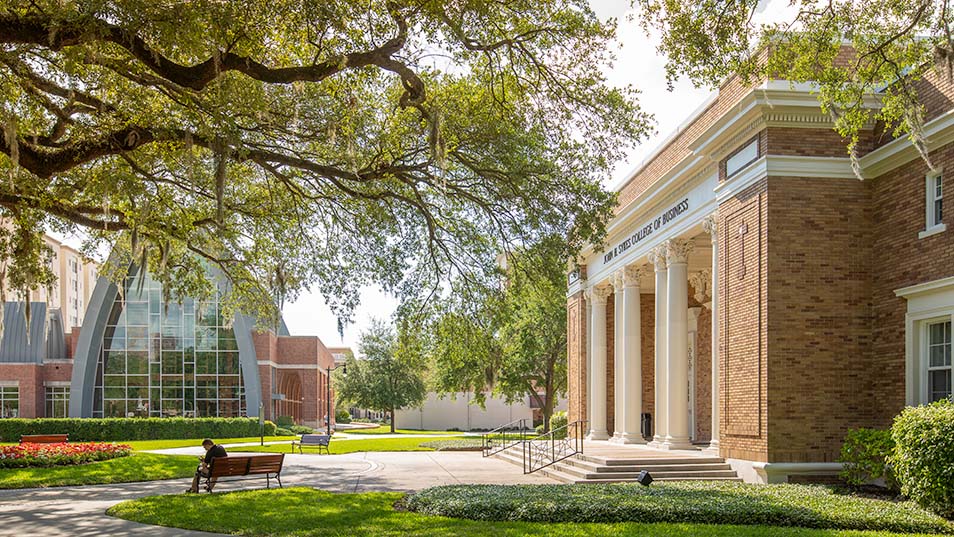Published: January 26, 2018
UT's Nonprofit Management Program is Small but Mighty
The good news for nonprofits is that the average employment growth rate is significantly higher than business and government sectors.
The bad news? The management retirement rate in nonprofits is just as high, resulting in an increasing need for qualified and knowledgeable leaders.
In response, the Nonprofit Leadership Center and the Conn Foundation partnered to develop a nonprofit management program at UT. Now in its 11th year, the program trains both future leaders and people already in the field who want to up their game and improve their skills.
"It's small but mighty," says Amy Harris, director of the program and an associate professor of management. "Enough time has passed now that we can see the impact it's made in this community. A lot of learning takes place, and then it's followed by the fruits of all that labor."
Scholarships from the Conn Foundation are available to participants who work in local nonprofits, which means the Tampa Bay area is a direct beneficiary of the program.
Participants focus on four major areas: governance and strategic management; marketing, research and communication; financial management; and leadership and innovation. They also are split into smaller cohort groups to choose one local nonprofit for a study project that concentrates on each of the specialized areas.
For Harris, it's been both eye-opening and inspiring to work with people who have such passion.
"These are folks who go to work in the morning so they can make a difference in this community. That's pretty powerful," she says. "If we can help them be more successful in their mission, we've done our job."
***
Confronting a crisis or complicated behavioral issue is a passion of Clara Reynolds MBA '10.
So it's no surprise that she's the president and CEO of the Crisis Center of Tampa Bay, which just won the Nonprofit of the Year award in the Crisis Resources category from the Tampa Bay Business Journal.
"It's always been a calling to me to help the most vulnerable in a time of critical need," she says.
And she is the first to credit UT for its part in her growth as a leader in this field.
She learned quickly that having a background in delivering programs is one thing, but managing the business side of the enterprise needed a whole new set of skills.
"I think that's why you see so many failures in nonprofits," Reynolds says. "As good as your intentions are, you have to know how to keep it viable and sustaining."
So she enrolled in the first class of UT's nonprofit management program, earning her certificate in 2008. And she didn't stop there. With a scholarship from the Conn Foundation, she continued in UT's MBA program, applying 12 credit hours from the certificate training toward her graduate degree.
In 2010, she got her MBA with a concentration in nonprofit management - a personal triumph, considering she had done it while juggling course work, keeping Success 4 Kids on track and raising a young son with her husband, the chief financial officer for the College of Internal Medicine at the University of South Florida.
As challenging as that balancing act was for a few years, Reynolds says it has paid off ten-fold. She built relationships with professors and professionals working with UT, tapping their knowledge in areas where her experience was lacking. Among other important lessons, she learned the value of seeking diversified funding sources and staying laser-focused on long-term goals rather than short-term gains.
The program played a critical role in her decision to leave the nonprofit she founded and accept the position at the Crisis Center in 2015. The leap was substantial: She was moving from a $5 million organization to one with a $12 million annual budget, more than 200 staff members and 100 volunteers in three main locations and one service center at Tampa International Airport.
"I felt qualified and ready for the new challenge," Reynolds says. "Now it was the business side of me that wanted a new opportunity to oversee a larger operation. I know the MBA gave me that confidence."
With two years at the helm of the Crisis Center, Reynolds can say with certainty that it was a good decision to make this move.
"The same fundamental principles apply whether you're working at a small nonprofit or a large corporation," she says. "I will always be grateful that I invested the time into this program. As crazy as my schedule was back then, it was just a short, hard sprint in the marathon of life, and the impact has been more than I could ever imagine."
This story first appeared in the Fall 2017 Journal. Read about several more graduates of the nonprofit management program and how they applied their training.



